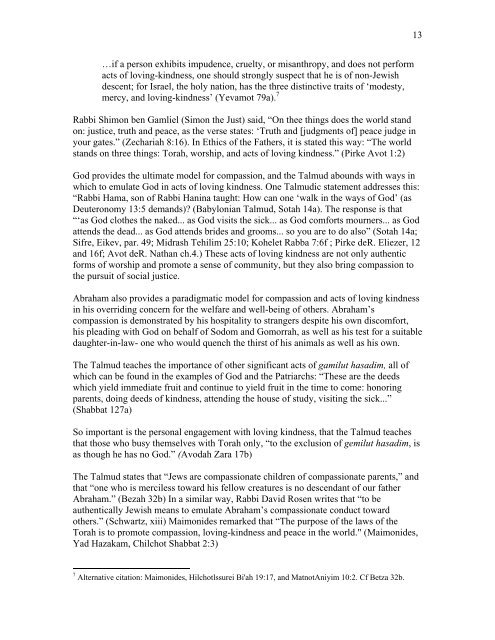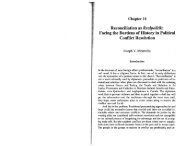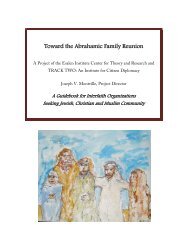The Ethics and Pro-Social Values in Judaism, Christianity and Islam ...
The Ethics and Pro-Social Values in Judaism, Christianity and Islam ...
The Ethics and Pro-Social Values in Judaism, Christianity and Islam ...
You also want an ePaper? Increase the reach of your titles
YUMPU automatically turns print PDFs into web optimized ePapers that Google loves.
13<br />
…if a person exhibits impudence, cruelty, or misanthropy, <strong>and</strong> does not perform<br />
acts of lov<strong>in</strong>g-k<strong>in</strong>dness, one should strongly suspect that he is of non-Jewish<br />
descent; for Israel, the holy nation, has the three dist<strong>in</strong>ctive traits of ‘modesty,<br />
mercy, <strong>and</strong> lov<strong>in</strong>g-k<strong>in</strong>dness’ (Yevamot 79a). 7<br />
Rabbi Shimon ben Gamliel (Simon the Just) said, “On thee th<strong>in</strong>gs does the world st<strong>and</strong><br />
on: justice, truth <strong>and</strong> peace, as the verse states: ‘Truth <strong>and</strong> [judgments of] peace judge <strong>in</strong><br />
your gates.” (Zechariah 8:16). In <strong>Ethics</strong> of the Fathers, it is stated this way: “<strong>The</strong> world<br />
st<strong>and</strong>s on three th<strong>in</strong>gs: Torah, worship, <strong>and</strong> acts of lov<strong>in</strong>g k<strong>in</strong>dness.” (Pirke Avot 1:2)<br />
God provides the ultimate model for compassion, <strong>and</strong> the Talmud abounds with ways <strong>in</strong><br />
which to emulate God <strong>in</strong> acts of lov<strong>in</strong>g k<strong>in</strong>dness. One Talmudic statement addresses this:<br />
“Rabbi Hama, son of Rabbi Han<strong>in</strong>a taught: How can one ‘walk <strong>in</strong> the ways of God’ (as<br />
Deuteronomy 13:5 dem<strong>and</strong>s)? (Babylonian Talmud, Sotah 14a). <strong>The</strong> response is that<br />
“‘as God clothes the naked... as God visits the sick... as God comforts mourners... as God<br />
attends the dead... as God attends brides <strong>and</strong> grooms... so you are to do also” (Sotah 14a;<br />
Sifre, Eikev, par. 49; Midrash Tehilim 25:10; Kohelet Rabba 7:6f ; Pirke deR. Eliezer, 12<br />
<strong>and</strong> 16f; Avot deR. Nathan ch.4.) <strong>The</strong>se acts of lov<strong>in</strong>g k<strong>in</strong>dness are not only authentic<br />
forms of worship <strong>and</strong> promote a sense of community, but they also br<strong>in</strong>g compassion to<br />
the pursuit of social justice.<br />
Abraham also provides a paradigmatic model for compassion <strong>and</strong> acts of lov<strong>in</strong>g k<strong>in</strong>dness<br />
<strong>in</strong> his overrid<strong>in</strong>g concern for the welfare <strong>and</strong> well-be<strong>in</strong>g of others. Abraham’s<br />
compassion is demonstrated by his hospitality to strangers despite his own discomfort,<br />
his plead<strong>in</strong>g with God on behalf of Sodom <strong>and</strong> Gomorrah, as well as his test for a suitable<br />
daughter-<strong>in</strong>-law- one who would quench the thirst of his animals as well as his own.<br />
<strong>The</strong> Talmud teaches the importance of other significant acts of gamilut hasadim, all of<br />
which can be found <strong>in</strong> the examples of God <strong>and</strong> the Patriarchs: “<strong>The</strong>se are the deeds<br />
which yield immediate fruit <strong>and</strong> cont<strong>in</strong>ue to yield fruit <strong>in</strong> the time to come: honor<strong>in</strong>g<br />
parents, do<strong>in</strong>g deeds of k<strong>in</strong>dness, attend<strong>in</strong>g the house of study, visit<strong>in</strong>g the sick...”<br />
(Shabbat 127a)<br />
So important is the personal engagement with lov<strong>in</strong>g k<strong>in</strong>dness, that the Talmud teaches<br />
that those who busy themselves with Torah only, “to the exclusion of gemilut hasadim, is<br />
as though he has no God.” (Avodah Zara 17b)<br />
<strong>The</strong> Talmud states that “Jews are compassionate children of compassionate parents,” <strong>and</strong><br />
that “one who is merciless toward his fellow creatures is no descendant of our father<br />
Abraham.” (Bezah 32b) In a similar way, Rabbi David Rosen writes that “to be<br />
authentically Jewish means to emulate Abraham’s compassionate conduct toward<br />
others.” (Schwartz, xiii) Maimonides remarked that “<strong>The</strong> purpose of the laws of the<br />
Torah is to promote compassion, lov<strong>in</strong>g-k<strong>in</strong>dness <strong>and</strong> peace <strong>in</strong> the world." (Maimonides,<br />
Yad Hazakam, Chilchot Shabbat 2:3)<br />
7 Alternative citation: Maimonides, Hilchotlssurei Bi'ah 19:17, <strong>and</strong> MatnotAniyim 10:2. Cf Betza 32b.




